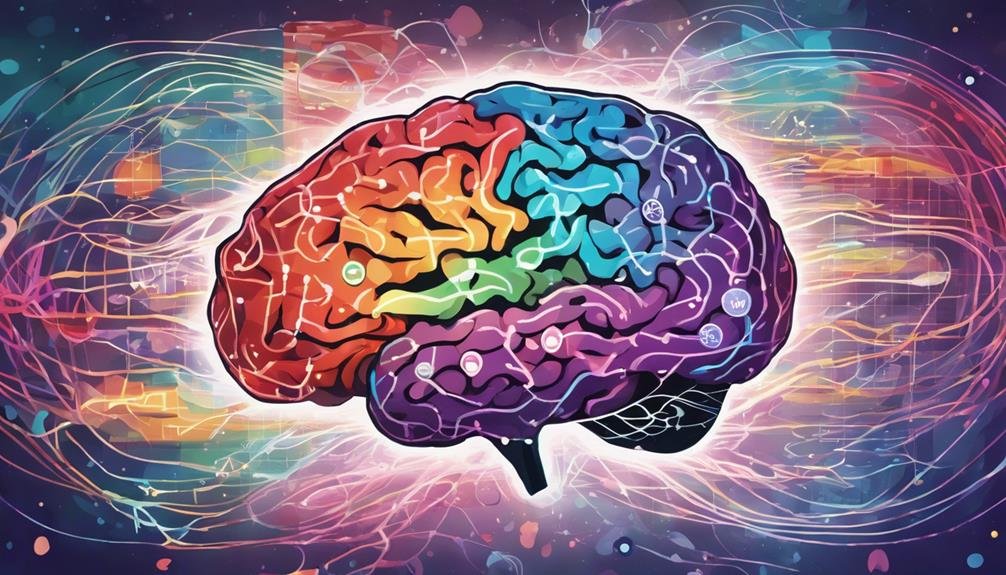The Science of Emotional Intelligence
Explore the intricate science of emotional intelligence where emotions blend with cognition to influence personal and professional relationships profoundly. Understand how skills like self-awareness and empathy are essential for social interactions. Discover how techniques such as deep breathing can help you manage your emotions effectively. Uncover the neurological aspects of emotional intelligence, involving brain regions like the amygdala and prefrontal cortex. Learning about emotional intelligence can lead to greater self-awareness and improved well-being, offering valuable insights into enhancing your interpersonal skills.
Key Takeaways
- Emotional intelligence involves self-awareness and empathy.
- Key components include self-regulation, social skills, and motivation.
- EQ training programs enhance communication and leadership.
- Understanding neural pathways aids in emotional intelligence.
- Emotional regulation techniques impact overall well-being.
The Basics of Emotional Intelligence
Understanding the fundamentals of emotional intelligence is essential for maneuvering through complex social interactions and fostering meaningful relationships. Emotional self-control techniques are vital in managing your reactions in various situations. By being aware of your emotions and practicing techniques such as deep breathing or taking a moment to pause before responding, you can prevent impulsive reactions that may harm your relationships.
Additionally, relationship management strategies play a key role in enhancing your emotional intelligence. These strategies involve active listening to understand others' perspectives, empathizing with their feelings, and effectively communicating your own emotions. By developing strong relationship management skills, you can navigate conflicts more constructively and build deeper connections with those around you.
Embracing these techniques and strategies won't only improve your emotional intelligence but also enrich your personal and professional relationships, leading to greater overall well-being and success.
Components of Emotional Intelligence
As you explore the components of emotional intelligence, you'll encounter key elements such as emotional self-awareness and social awareness skills.
These components play vital roles in understanding and managing emotions effectively.
Key EQ Components
Exploring the domain of emotional intelligence involves identifying and refining key EQ components that contribute to effective interpersonal relationships and personal growth. Understanding emotional intelligence (EQ) requires recognizing its key components, such as self-awareness, self-regulation, empathy, social skills, and motivation.
These elements form the foundation for managing social interactions, handling emotions, and fostering positive relationships. EQ assessment tools play an essential role in helping individuals gauge their emotional strengths and areas for development, leading to enhanced self-awareness and personal growth.
Additionally, EQ training programs have shown effectiveness in improving communication, conflict resolution, and leadership skills. By honing these key EQ components, individuals can cultivate stronger emotional intelligence, which can positively impact both professional and personal aspects of life.
Emotional Self-Awareness
Emotional self-awareness forms the cornerstone of emotional intelligence, allowing individuals to recognize and understand their own feelings and reactions. This skill involves self-reflection, growth, mindfulness, and introspection. By honing emotional self-awareness, you can enhance your ability to navigate challenging situations, regulate emotions effectively, and foster stronger relationships.
Here are five key aspects to ponder:
- Recognizing Emotions: Acknowledge your feelings without judgment.
- Understanding Triggers: Identify what situations or interactions impact your emotions.
- Self-Reflection Practices: Engage in activities like journaling or meditation to deepen self-awareness.
- Acceptance of Emotions: Embrace the full range of your emotions without suppression.
- Feedback Seeking: Seek input from trusted individuals to gain insights into your emotional responses.
Social Awareness Skills
To develop social awareness skills, start by observing and understanding the emotions and perspectives of those around you. By paying attention to social cues, such as body language and tone of voice, you can gain valuable insights into how others are feeling.
Empathy training is an essential aspect of enhancing social awareness. This involves putting yourself in someone else's shoes and truly trying to comprehend their emotions and experiences. Through empathy training, you can build stronger connections with others and navigate social interactions more effectively.
Developing social awareness skills isn't only beneficial for your personal relationships but also for your professional life, as it allows you to collaborate better with colleagues and understand the needs of those around you.
Emotional Intelligence Vs. IQ
Comparing emotional intelligence with IQ reveals significant differences in how individuals perceive and navigate the world around them. Emotional intelligence focuses on understanding and managing emotions, while IQ primarily measures cognitive abilities such as problem-solving and logical reasoning. Here are some key distinctions between emotional intelligence and IQ:
- Emotional Awareness: Emotional intelligence emphasizes recognizing and understanding your own emotions and those of others, whereas IQ centers on analytical and critical thinking skills.
- Interpersonal Relationships: Emotional intelligence places importance on building strong relationships and effective communication, while IQ highlights academic and intellectual capabilities.
- Adaptability: Emotional intelligence involves being flexible and adaptable in various social situations, whereas IQ tends to focus on fixed cognitive abilities.
- Empathy: Emotional intelligence involves empathizing with others and considering their feelings, while IQ is more centered on individual analytical thinking.
- Self-Regulation: Emotional intelligence emphasizes managing and controlling emotions effectively, while IQ focuses on problem-solving and decision-making skills.
The Neuroscience Behind EQ
As you explore the neuroscience behind EQ, you'll uncover the intricate relationship between brain function and emotions. Understanding the neural pathways involved in emotional processing can shed light on how emotional intelligence operates at a neurological level.
Brain and Emotions
Exploring the intricate connection between the brain and emotions sheds light on the neuroscience behind Emotional Intelligence (EQ). Neuroscience insights reveal how different regions of the brain play vital roles in processing emotional responses.
- The amygdala, known for processing emotions, particularly fear and pleasure.
- The prefrontal cortex, involved in regulating emotions and decision-making.
- The hippocampus, responsible for memory formation and emotional regulation.
- The insula, facilitating self-awareness and empathy.
- The anterior cingulate cortex, managing emotional responses and social interactions.
Understanding how these brain regions interact and influence emotional intelligence provides valuable insights into how individuals perceive, understand, and regulate emotions in themselves and others.
Neural Pathways Involved
Understanding the neural pathways involved in Emotional Intelligence (EQ) offers a glimpse into the intricate workings of the brain in perceiving and managing emotions.
Neural pathways are the routes through which signals travel in the brain, influencing our emotional responses. These pathways connect various regions of the brain, such as the amygdala, prefrontal cortex, and insula, playing significant roles in processing and regulating emotions.
For instance, the amygdala is responsible for the initial emotional response, while the prefrontal cortex helps in evaluating and controlling these responses. The insula integrates bodily sensations with emotional experiences.
Emotional Regulation Techniques
Studying emotional regulation techniques through a neuroscientific lens sheds light on how individuals can effectively manage their emotions to enhance their emotional intelligence (EQ).
When it comes to emotional regulation, incorporating mindfulness techniques and self-care practices can have a significant impact on your well-being. These strategies not only help in recognizing and understanding your emotions but also aid in regulating them effectively.
Additionally, coping strategies play an essential role in managing stress levels, which in turn can positively influence your emotional intelligence. By incorporating stress management techniques into your daily routine, you can navigate challenging situations with greater ease and maintain a balanced emotional state.
Remember, emotional intelligence is a skill that can be honed through consistent practice and self-awareness.
- Practice mindfulness techniques daily
- Engage in self-care practices regularly
- Develop effective coping strategies
- Prioritize stress management in your routine
- Cultivate emotional balance through conscious efforts
Developing Emotional Intelligence Skills
Developing your emotional intelligence skills involves actively practicing self-awareness and empathy in various social interactions. Mindful communication plays a significant role in enhancing emotional intelligence. By consciously listening and responding to others with empathy and understanding, you can improve your ability to connect with people on a deeper level. Empathy building is another essential aspect of developing emotional intelligence. By putting yourself in someone else's shoes and trying to understand their emotions and perspectives, you can foster better relationships and navigate social situations more effectively.
To enhance your emotional intelligence skills, engage in reflective practices such as journaling or meditation to deepen your self-awareness. Pay attention to your emotions, triggers, and reactions in different situations, and work on regulating them constructively. Additionally, seek feedback from others to gain insights into how your emotions and behaviors impact those around you.
Applications of Emotional Intelligence
Emotional intelligence plays a vital role in various aspects of personal and professional interactions, influencing outcomes greatly. When considering workplace applications, individuals with high emotional intelligence tend to excel in leadership roles, conflict resolution, and teamwork. They can navigate office dynamics with ease, fostering a positive work environment and enhancing overall productivity.
With regards to relationship management, emotional intelligence plays a significant role in building strong connections and resolving conflicts effectively. Here are five key ways in which emotional intelligence can be applied in everyday scenarios:
- Conflict Resolution: Utilizing empathy and understanding to navigate disagreements peacefully.
- Team Collaboration: Enhancing team dynamics by being aware of and regulating emotions during group projects.
- Leadership Development: Inspiring and motivating others through self-awareness and effective communication.
- Customer Service: Improving customer interactions by showing empathy and understanding their needs.
- Stress Management: Handling pressure and challenges in a composed manner to maintain productivity and well-being.
Enhancing Emotional Intelligence in Practice
Implementing strategies to boost emotional intelligence in practical settings can lead to improved interpersonal relationships and enhanced decision-making skills. Practical exercises are essential for honing emotional intelligence. These exercises often involve real-life scenarios that challenge you to recognize and regulate your emotions effectively.
For example, practicing active listening during a difficult conversation with a colleague can help you understand their perspective better and respond empathetically. Engaging in mindfulness techniques, such as deep breathing or meditation, can also enhance your emotional intelligence by increasing self-awareness and reducing reactivity to stressors in real-time situations.
Conclusion
In summary, mastering the science of emotional intelligence is essential for maneuvering through the complexities of human interactions.
By understanding the components and benefits of EQ, you can enhance your relationships, communication skills, and overall well-being.
Remember, just like a compass guides a lost traveler through unfamiliar terrain, emotional intelligence can lead you through the ups and downs of life, helping you find your true north in the stormy sea of emotions.








